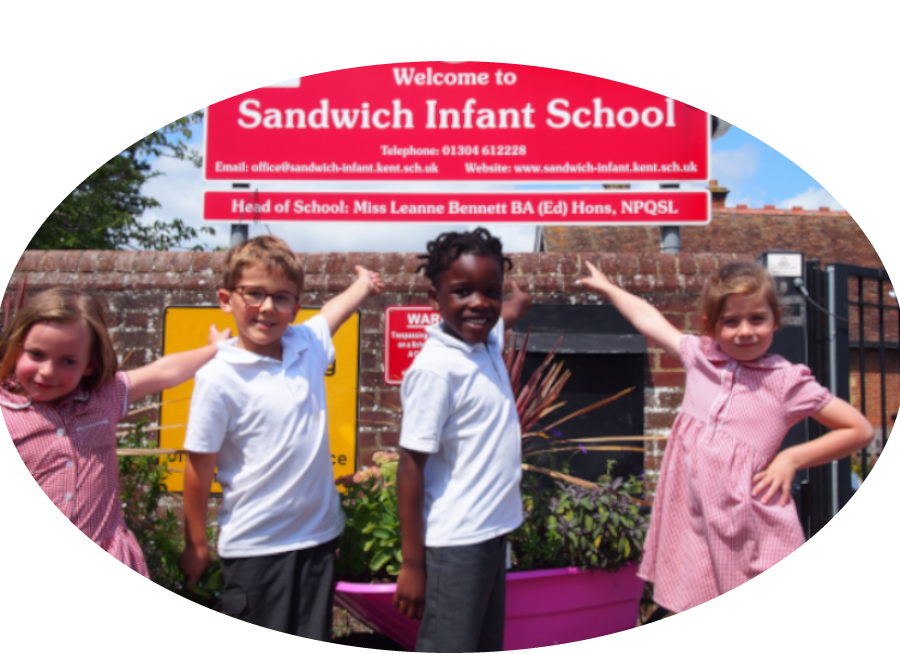At Sandwich Infant School, it is important that our children develop a lifelong love of language and literature. Reading is one of the key routes in which we wish to achieve this. Building a broad vocabulary, a love of reading and an ability to communicate effectively through a text will allow all of our children to achieve. Through repetition and skilled teaching, we provide our children with a range of opportunities to grow their ability to read. We would like to not only provide children with the vital skills of reading through phonics, but want to show children how enjoyable books can be, thus to set in place positive reading habits from the outset.
By the time children leave us, they will read confidently for meaning and regularly enjoy reading for pleasure. Our readers are equipped with the tools to tackle unfamiliar vocabulary. We encourage our children to see themselves as readers for both pleasure and purpose.
Because we believe teaching every child to read is so important, we have a Reading Leader who drives the early reading programme in our school. This person is highly skilled at teaching phonics and reading, and they monitor and support our reading team, so everyone teaches with fidelity to the Little Wandle Letters and Sounds Revised programme.
Reading Practice sessions
When entering any one of our classrooms, you will see the teaching of reading through ‘Reading Practice’ sessions. These will take place at least three times a week. These are taught by a fully trained adult to small groups of approximately six children. We use books matched to the children’s secure phonic knowledge using the Little Wandle Letters and Sounds Revised assessments. These sessions are monitored by the class teacher, who rotates and works with each group on a regular basis.
Each reading practice session has a clear focus, so that the demands of the session do not overload the children’s working memory. The reading practice sessions have been designed to focus on three key reading skills:
- decoding
- prosody: teaching children to read with understanding and expression
- comprehension: teaching children to understand the text.
In Reception these sessions start in Week 4. Children who are not yet decoding have daily additional blending practice in small groups, so that they quickly learn to blend and can begin to read books.
In Year 2, we continue to teach reading in this way for any children who still need to practise reading with decodable books.
Home reading
A decodable reading practice book is taken home to ensure success is shared with the family.
Reading for pleasure books also go home for parents to share and read to children. We use the Little Wandle Letters and Sounds Revised parents’ resources to engage our families and share information about phonics, the benefits of sharing books, how children learn to blend and other aspects of our provision, both online and through workshops.
Ensuring consistency and pace of progress
Every teacher in our school has been trained to teach reading, so we have the same expectations of progress. We all use the same language, routines and resources to teach children to read so that we lower children’s cognitive load.
Weekly content grids map each element of new learning to each day, week and term for the duration of the programme.
Lesson templates, Prompt cards and How to videos ensure teachers all have a consistent approach and structure for each lesson.
The Reading Leader and SLT use the Audit and Prompt cards to regularly monitor and observe teaching; they use the summative data to identify children who need additional support and gaps in learning.
Ensuring reading for pleasure
We value reading for pleasure highly and work hard as a school to grow our Reading for Pleasure pedagogy.
We read to children every day. We choose these books carefully as we want children to experience a wide range of books, including books that reflect the children at Sandwich Infant School and our local community as well as books that open windows into other worlds and cultures.
Every classroom has an inviting book corner that encourages a love for reading. We curate these books and talk about them to entice children to read a wide range of books. In Reception, children have access to the reading corner every day in their free flow time and the books are continually refreshed.
Children from Reception onwards have a home reading record. The parent/carer records comments to share with the adults in school and the adults will write in this on a regular basis to ensure communication between home and school.
As the children progress through the school, they are encouraged to write their own comments and keep a list of the books/authors that they have read.
The school library is made available for classes to use at protected times. Children across the school have regular opportunities to engage with a wide range of Reading for Pleasure events (book fairs, author visits and workshops, national events etc).
Children at Sandwich Infant School love reading; they love listening to stories; they love sharing books with their friends; they love “escaping” with a book themselves. By the time our children leave our school, they are confident, fluent readers.
Our children enjoy their reading sessions and are happy and confident to talk about their learning; they are able to talk about favourite texts and authors and recommend a book with justification.
Our children can confidently use a range of strategies for decoding words. Attainment in reading is measured using the statutory assessments at the end of Key Stage One. These results are measured against the reading attainment of children nationally. Children will make at least good progress in reading from their starting point in EYFS.
Core curriculum texts






